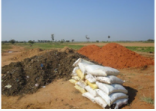INTRODUCTION & OBJECTIVE
DeCarbonic(DC), hereby present this report as an integral component of the Soil Carbon project conducted at V. Kenipattu, Pondicherry. The collaborative effort behind this report involves DeCarbonic and Integra Solutions.
The primary focus of this report revolves around establishing robust on-farm field monitoring techniques for soil carbon and its associated indicators of soil health. It is designed to cater to landowners aiming to assess and comprehend their soil carbon stocks, along with advisors and researchers who provide support in this domain.
In the pursuit of creating a system that emphasizes soil carbon sequestration as a vital element in climate change mitigation, the Soil Carbon Report worked closely with the Bioville Organic Farm (BOF) tech team at Pondicherry. This collaboration enabled us to realign soil sampling methodologies and generate farm-level
insights into the best practices for achieving this goal.

The key objectives of the SOC Report include:
- Quantifying Soil Organic Carbon: The report aims to measure and quantify the amount of organic carbon present in the soil. This data is crucial for understanding the soil’s ability to sequester carbon and its role in mitigating climate change.
- Mapping Carbon Distribution: By mapping the distribution of Soil Organic Carbon across different land areas or soil layers, the report aims to identify hotspots and areas with higher carbon storage capacity.
- Assessing Soil Health: The SOC Report evaluates the relationship between Soil Organic Carbon and soil health indicators, such as soil fertility, water retention, and nutrient availability. This assessment helps to gauge the overall soil health and its capacity to support sustainable agriculture.
- Understanding Carbon Sequestration Potential: The report aims to identify factors that influence carbon sequestration in the soil, such as land use, vegetation cover, and management practices. This understanding assists in devising strategies to enhance carbon sequestration and promote climate-resilient agriculture.
- Supporting Land Management Decisions: The SOC Report provides valuable data and insights that aid
landowners, farmers, and policymakers in making informed decisions regarding land management, agricultural practices, and environmental conservation. - Contributing to Climate Change Mitigation: By assessing Soil Organic Carbon levels and potential, the report supports efforts to quantify the soil’s role in carbon sequestration and its contribution to climate change mitigation.
- Guiding Sustainable Land Use Practices: The SOC Report recommends sustainable land use practices that help improve soil carbon stocks and contribute to overall land and ecosystem resilience.
- Facilitating Policy Formulation: The data and analysis presented in the SOC Report contribute to the
formulation of policies and guidelines aimed at promoting sustainable soil management practices and
enhancing carbon sequestration.
Approximately one-third of the world's soils are in a state of degradation, leading to the release of a substantial 78 gigatons (Gt) of carbon dioxide into the atmosphere. This phenomenon exacts a toll, accounting for more than 10% of the global Gross Domestic Product (GDP) due to the loss of biodiversity and ecosystem services (FAO 2019).
BOF APPROACH FOR THE SOIL ENRICHMENT:
APPLICATION OF ENRICHED PRESS MUD:
 The practice involves the application of 10 tonnes of enriched press mud per acre. This contributes significantly to augmenting the carbon content and enriching the soil with essential nutrients such as Nitrogen, Phosphorous, Potassium, and other vital micro-nutrients.
The practice involves the application of 10 tonnes of enriched press mud per acre. This contributes significantly to augmenting the carbon content and enriching the soil with essential nutrients such as Nitrogen, Phosphorous, Potassium, and other vital micro-nutrients.
APPLICATION OF FARM YARD MANURES / COMPOST:
The practice entails the application of 5 tonnes of farm yard manure per acre, which serves to elevate the carbon and Nitrogen levels within the soil. (Application of 10 tons of FYM to the soil contributes 50Kg N, 20Kg P2O5, and 50 Kg K2O.)

